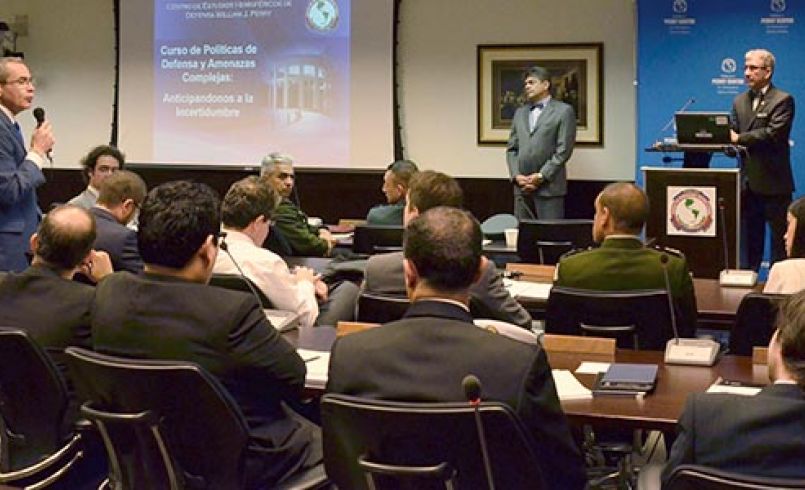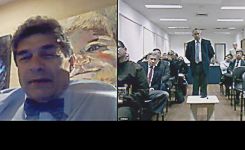- William J. Perry Center for Hemispheric Defense...
- Perry Center Explores Solutions to Complex Thre...
Perry Center Explores Solutions to Complex Threats in New Academic Course
July 15, 2016
More than 30 students from 10 Latin American countries are attending a new academic course at the William J. Perry Center on how to handle complex security threats. The course, Defense Policy and Complex Threats (DPCT), is directed by Dr. Luis Bitencourt and Professor Guillermo Pacheco. It is a part of a series of Perry Center courses designed to improve the institutional efficiencies of security ministries in the Americas in the face of the convergence of threats such as organized crime and terrorism.
On the first day, the students were welcomed by the Director of the Center Perry Mark Wilkins and Ambassador Wanda L. Nesbitt, Vice President of the National Defense University. Students also have a chance to hear from representatives of the Office of the Secretary of Defense, U.S. Southern Command, other partner nations, and representatives from National Defense University.
The course aims to provide students with the methodological tools and techniques for the development of effective policies to a complex context and rapid changes in the threats. Over the course of the ten days, students examine methodologies such as SWOT (strengths, weaknesses, opportunities, and threats), SMART (Specific, Measurable, Attainable, Realistic, Timely), the Delphi Method, and the CAPA methodology, among others.
* * *
Más de 30 estudiantes de 10 países de América Latina están asistiendo a un nuevo curso académico en el Centro J. Perry sobre cómo manejar las amenazas complejos. El curso, de Política de Defensa y amenazas complejas: anticipándonos a la incertidumbre (DPCT), está dirigido por el Dr. Luis Bitencourt y el profesor Guillermo Pacheco. Es parte de una serie de cursos que el Centro Perry ha diseñado para mejorar la eficiencia institucional de los ministerios de defensa en las Américas de cara a la convergencia de amenazas con una naturaleza compleja.
En el primer día, los estudiantes fueron recibidos por el Director del Centro de Perry Mark Wilkins y la Embajadora Wanda L. Nesbitt, vicepresidente de la Universidad Nacional de Defensa. Los estudiantes también tendrán la oportunidad de escuchar a representantes de la Oficina del Secretario de Defensa, el Comando Sur de EE.UU., otras naciones asociadas, y representantes de la Universidad Nacional de Defensa.
El curso tiene como objetivo proporcionar a los estudiantes las herramientas metodológicas y técnicas para el desarrollo de políticas efectivas para un contexto complejo y de rápidos cambios en las amenazas. En el transcurso de los diez días, los estudiantes examinan las metodologías como DAFO (FODA: fortalezas, debilidades, oportunidades y amenazas), SMART (Objetivos: específicos, medibles, alcanzables, realistas, oportunos), el Método Delphi, y la metodología CAPA, entre otros.



